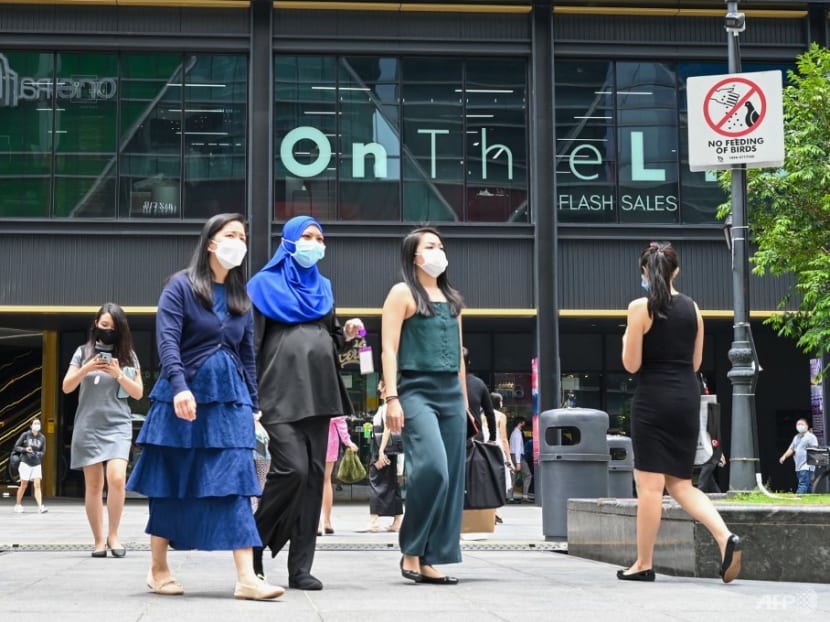Individuals should not be ‘too anxious or fearful’ about rising daily COVID-19 numbers: Lawrence Wong

People wearing face masks are seen at the Raffles Place financial business district in Singapore on Sep 14, 2021. (Photo: AFP/Roslan Rahman)
SINGAPORE: Singapore should not “get too carried away” or be “too anxious or fearful” about daily COVID-19 case numbers, said co-chair of the multi-ministry task force Lawrence Wong, as he asked the public for patience amid the pandemic.
Speaking at a multi-ministry task force press conference on Saturday (Oct 2), Mr Wong addressed the two different reactions emerging as the number of daily cases spike.
“Of course, when we see such surge of cases during these few days, several thousand a day, I know it can be quite worrying and you have two sort of very sharp reactions from different people,” he noted.
“One group says ‘Look, it's so high, let's quickly lock down and bring cases down'. Another group says, ‘Well, this is completely to be expected, after all we talked about living with COVID, so move forward'.”
Responding to the first group calling for restrictions to be tightened further, Mr Wong noted that Singapore has “gone beyond that point”.
“We’ve already said, because of our high vaccination rate, we are no longer focusing solely on headline numbers. Our focus is on the people who are seriously ill and to make sure that our healthcare system is able to take care of them,” he added.
“So let's not get too carried away by the headline numbers or too anxious or fearful about those numbers.”
For the second group of people calling for more reopening measures, Mr Wong urged them to be patient.
“Our overall strategy to reopening has not changed. But this is the first time we are experiencing such a big wave, and it is causing tremendous stresses on our healthcare system, and our healthcare workers,” he added.
Procedures and protocols have to be changed and adjusted, and capacity has to be added into the system, said Mr Wong, who is also Finance Minister.
“All this takes a little bit of time and that's why we are putting in place these measures in the stabilisation phase so that we can get all these things ready,” he added.
Singapore should also be prepared that this will not be the last COVID-19 wave it experiences, said Mr Wong.
“We are riding one major, one big wave now, but we should be mentally prepared that there will be subsequent waves to follow,” he added.
“It's because we are one of the most COVID-naive populations in the world, unlike, for example, many other European countries.”
A COVID-19 naive person is someone who has not been exposed to antigens from the virus and has not formed the antibodies to fight it.
The number of infections in Singapore has been kept low “for a very long time”, unlike many European countries that experienced large waves in 2020, before they had the chance to vaccinate their population, Mr Wong noted.
“And many countries ended up paying a high price, suffering high fatalities because of the waves that they experienced last year.
“But now they have a much higher level of natural immunity, and together with the vaccination programmes that they have introduced, many of these countries have reached the new COVID-stable situation where they are able to resume activities and they have not seen any resurgence of cases.”
Singapore is in a “different position”, said Mr Wong.
“In many ways we are fortunate because we are facing this wave now with a much more highly vaccinated population,” he added, noting that this means the vast majority of people in Singapore will be protected against serious illness.
This also means Singapore can get through this wave and subsequent waves with fewer casualties than the European countries, said Mr Wong.
“Eventually, with high vaccinations and with a higher level of natural immunity, we too will eventually reach a point perhaps months later, where we are more similar to the European countries, and the COVID situation stabilises, and we are able to reopen more confidently without seeing a new wave of cases.”
Singapore will continue to monitor the situation over the next few days to see the impact of the new measures on slowing down the rate of transmission, said Mr Wong.
“To be clear, as we have stated before, we do not expect the new measures to help to bring down the total number of daily cases,” he added.
“Rather the new measures are aimed at slowing the rate of increase of transmission and that’s to give us the time to stabilise all the healthcare protocols we talked about and to strengthen and enhance capacity in our hospital system.”
BOOKMARK THIS: Our comprehensive coverage of the COVID-19 pandemic and its developments
Download our app or subscribe to our Telegram channel for the latest updates on the coronavirus pandemic: https://cna.asia/telegram









